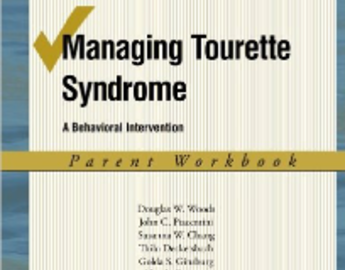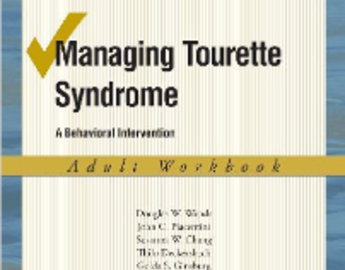
Information about Tourette syndrome and tics
Information about Tourette syndrome and tics
Written by Tamara Pringsheim, MD FRCPC Neurology
Tourette syndrome is a childhood onset neuropsychiatric condition characterized by motor and phonic tics. It is a very common condition, affecting approximately 1% of school-age children.
Tics are repetitive and recurrent movements or vocalizations. Tics are often preceded by a sensation or urge and may be temporarily supressed. Motor tics can affect any part of the body, but they most often involve the face and neck regions. Examples of common motor tics include repetitive blinking, eye movements, facial grimacing or neck movements. Phonic tics most commonly consist of simple sounds, such as throat clearing, sniffing or coughing, but can include elements of language, such as syllables, words or phrases.
Tics usually begin gradually, with waxing and waning of tic frequency over time. New tics come and go over periods of weeks to months. Onset is almost exclusively in childhood, usually before age 12, and most commonly between the ages of 6 and 7. Tics are more common in boys than girls, by a factor of three to one.
When a person has multiple motor and at least one phonic tic for at least one year, with onset prior to adulthood, a diagnosis of Tourette syndrome is made, provided there is no other medical condition present that could cause tics. When only motor tics are present, a diagnosis of persistent motor tic disorder is made; when only phonic tics are present, a diagnosis of persistent vocal tic disorder is made. When tics are present for less than a year, a provisional tic disorder is diagnosed.
Tics disorders are idiopathic neurodevelopmental conditions which are highly heritable. While specific genes causing tics have not been identified in the majority of affected people, a family history of tics is common. In identical twins, when one twin has been diagnosed with a tic disorder, there is a greater than 70% chance the other twin will also have tics, supporting a genetic etiology for this condition. There is some evidence that environmental factors, such as prematurity or low birth weight, can increase the risk of having a tic disorder.
There is a higher than expected rate of other neurodevelopmental and psychiatric conditions in people with Tourette syndrome, with Attention Deficit Hyperactivity Disorder and Obsessive-Compulsive Disorder being the most common. Approximately 50% of people with Tourette syndrome seen in specialty clinics will also be diagnosed with these conditions. Anxiety disorders, disruptive behaviour disorders, depression and autism are all more commonly diagnosed in people with Tourette syndrome than the general population.
Tics improve in late adolescence in many people with tic disorders. Research has shown that if we examine 100 people over the age of 16 who were diagnosed in childhood with Tourette syndrome:
- 18 will no longer have tics
- 22 will have minimal tics
- 37 will have mild tics
- 22 will have moderate tics
- 1 will have severe tics
The greatest predictor of tic severity in adulthood is tic severity in childhood. Children with more severe tics are more likely to have more severe tics in adulthood. There is emerging evidence that females may be more likely to have more severe tics in adulthood than males.
When tics cause physical, emotional or social impairment, there are both medical and psychological therapies that can help decrease tic severity.
Guidelines on the assessment and treatment of Tourette syndrome and chronic tic disorders have been published by the American Academy of Neurology - see the section directly below.

American Academy of Neurology
The American Academy of Neurology (AAN) Clinical Practice Guideline on the Treatment of Tics in People with Tourette syndrome and chronic tic disorders provides recommendations on the assessment and the treatment of tics. Based on a systematic review of the literature, experts in Tourette syndrome from across the world created recommendations for health care practitioners who provide care to people with tics. The AAN has created a summary of the guidelines for patients and families.
Link to AAN Summary of Guidelines for Patients and Families (PDF)

Understanding Tourette Syndrome: a primer
This webinar was presented by Julian Fletcher from the Tourette OCD Alberta Network on November 6, 2024.
Tourette Association of America
The TAA provides free resources about Tourette Syndrome, including: webinars, brochures, books, newsletters, DVDs, and videos. It has an extensive library of recorded webinars providing information and support on many aspects of living with Tourette syndrome.
The Brake Shop
The Brake Shop focuses on Tourette syndrome, OCD and ADHD, and is provided by the Ontario Child & Parent Resource Institute. It consists of the Brake Shop Virtual Clinic, which includes four videos: All-Purpose Kit, Exposure & Response Prevention Toolbox, Self-Management Toolbox and Tic Management Toolbox.
Tourette Canada
Tourette Canada provides information and resources about Tourette Syndrome, and offers a virtual peer support program for teens. Tourette Canada has local chapters in cities across Canada, providing local support for children, adults and families.
Nix Your Tics
This is a book by Dr. B. Duncan McKinlay, Psychologist, who has Tourette Syndrome. That means he’s been living with both motor tics (movements he has a hard time stopping) and phonic tics (noises he has a hard time stopping) for most of his life. He knows firsthand how annoying, embarrassing, misunderstood, painful, and disruptive tics can be. For years, he’s been educating people all around the world by means of his presentations and website, and through appearances on television, in magazines, and on film. Now, in Nix Your Tics!, he wants to share with you a well-established, evidence-based practice* he uses to manage tic symptoms in both himself and in his patients.
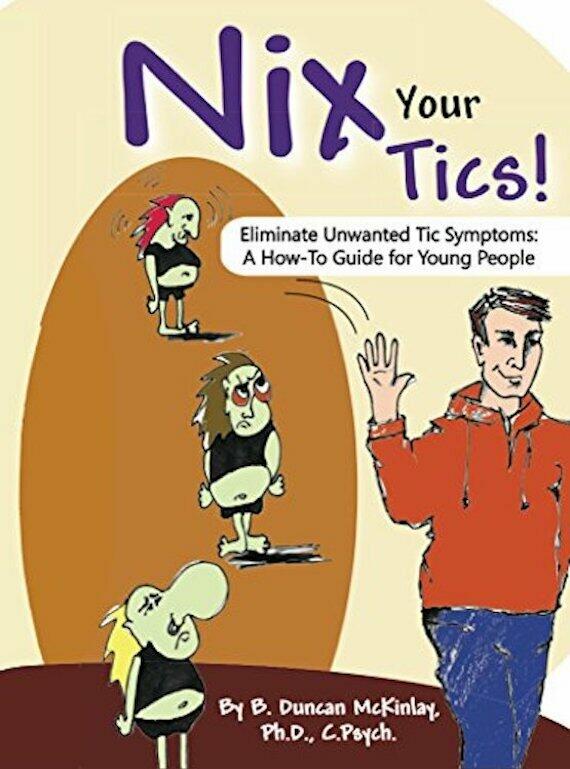
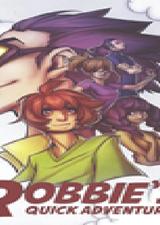
Robbie's Quick Adventure
Robbie's Quick Adventure is a book for children and youth with Tourette syndrome, based on the Canadian Guidelines for the Evidence-Based Treatment of Tourette Syndrome. Please email us (julian.fletcher@ucalgary.ca) to have a free copy mailed to you.
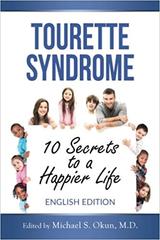
Tourette Syndrome: 10 Secrets to a Happier Life
Tourette Syndrome: 10 Secrets to a Happier Life, by Michael S. Okun. The book draws from Tourette Association of Americas's Centre of Excellence Program and outlines new approaches to the development of treatment for people with Tourette Syndrome and tic disorders.
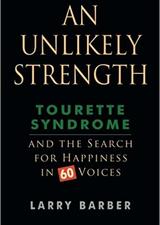
An Unlikely Strength
An Unlikely Strength: Tourette Syndrome and the Search for Happiness in 60 Voices, by Larry Barber, is a resource guide for families. It is based on intimate stories of how adults and children with Tourette Syndrome persevere, despite difficulties, with strength and hope.
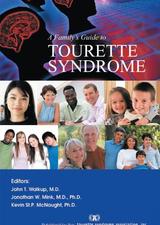
A Family's Guide to Tourette Syndrome
A Family Guide to Tourette Syndrome, Edited by John Walkup and others. The book provides authoritative and up-to-date medical and scientific information about Tourette Syndrome.
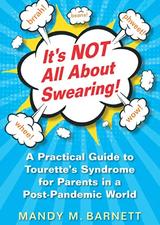
It's Not All About Swearing
The author, Dr Mandy M Barnett, who worked in the UK health service for 30 years, is the mother of two children who both have Tourette syndrome. Are you at your wits’ end with your child’s twitches, noises, and temper outbursts? Do you feel alone and a complete failure as a parent, with no clue what to do or where to start?
It doesn’t have to be that way.
Books for Children and Teenagers
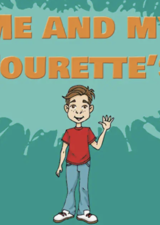
Me and My Tourette's
Written by Sianna Stodd and Gemma Denham.
Hello, I'm Alfie and I have Tourette Syndrome. "Here, I explain what it's like to live with TS. What causes my tics and what can make them better or worse. Byr reading my story, you'll learn to understand the challenges I face everyday and more importantly, what you can do to help me and others like me. This book is a lovely and important book that comes from both the head and the heart, and it doesn't make light of the condition. It can be really hard to cope with. It gives us the facts. It shows us that the hardest part of living with TS can be the reactions of others. And its last words are perhaps the most important: "Always remember to be kind."
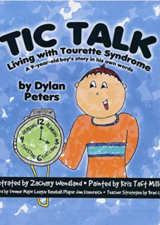
Tic Talk
The author, Dylan Peters, has lived with Tourette Syndrome more than half of his young life. Only four years old when he was first diagnosed with TS, Dylan is now nine and ready to enter the fourth grade. What he's learned about tolerance and acceptance during those five years, most of us fail to learn in an entire lifetime. In his own words, often humorous, always insightful, Dylan helps others, young and old, understand Tourette Syndrome and the enormous pressures this little, mysterious affliction places on those who have it and on those who love them. Illustrated by Dylan's friend, Zachary Wendland.
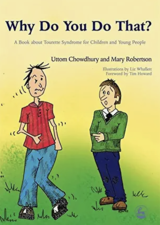
Why Do You Do That?
Med Head - My Knock-Down, Drug Out, Drugged-Up Battle With My Brain was written specifically for siblings of children with Tourette Syndrome, Why Do You Do That? is an age-appropriate source of information for children and adolescents aged 8 to 16. Uttom Chowdhury and Mary Robertson describe tics and Tourette's in clear, child-friendly terms and provide a simple explan ation of the biological causes. Other chapters focus on living with someone who has TS, associated features such as obsessive-compulsive disorder, attention deficit/hyperactivity disorder and aggression, and what siblings can do to help. The authors also offer practical tips on how to deal with issues such as problems at school and bullying.
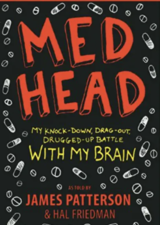
Med Head
How it does it feel to have a body that won't stop moving, to be really different from everyone else, to be made fun of every day, to be totally reckless, to never relax, to be shut out of everything, to break free and take control. This deeply personal account of Cory Friedman's intense struggles with Tourette's Syndrome and Obsessive Compulsive Disorder - as well as depression, anxiety, and alcohol addiction - is available for teen readers.
Adult Experiences
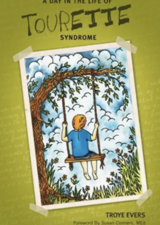
A Day in the Life of Tourette Syndrome
Written by Troye Evers. Like many people with Tourette syndrome, Troye Evers' symptoms began early in his childhood, but he was not officially diagnosed until he was eighteen years old. He remained in the closet about his diagnosis until his thirties, falsely attempting to pass off his symptoms as the result of bad sleep or a dry throat. After deciding he had enough, he penned a screenplay about his experiences that went on to win third place in the All Access Screen Writing competition. Two years later, he found himself voted on to the board of the Tourette Syndrome Association of New York City. Now using his influence and writing skills, he has collected the stories of seventeen other people, from all walks of life, living with Tourette syndrome.
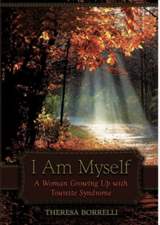
I Am Myself
I Am Myself: A Woman Growing Up with Tourettes Syndrome. In this book Thersea Borrelli recounts her journey from a diagnosis of Tourette Syndrome in childhood, to a state of acceptance. At first, Theresa developed an attitude that was defensive, and critical of the doctors who treated her. Slowly, as a young adult, she began to assimilate, acknowledge and reconcile her disorder, for which there is no cure. Though about Tourette Syndrome, I Am Myself offers the reader a universal experience, relatable to the challenges that all of us face at one time or another.



